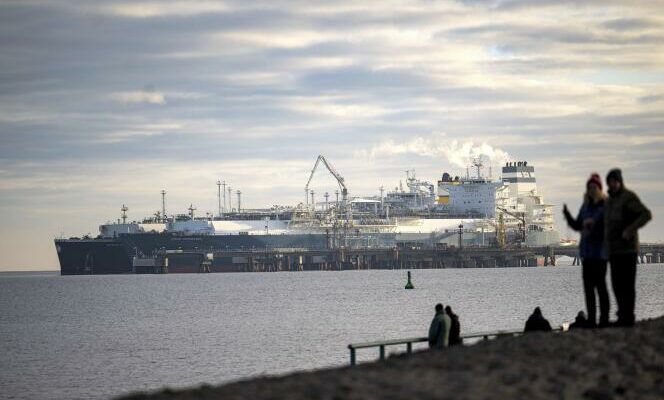Under the pale sun of Wilhelmshaven, in Lower Saxony, on the German North Sea coast, we await the arrival of the next LNG tanker. One happens every eight days. “The boats come from Angola, Norway, Nigeria, but most of the deliveries come from the United States”, underlines Thomas Hohmann, site director for the energy group Uniper, nationalized by Germany at the end of 2022. Dressed in a thick fluorescent yellow parka, an essential accessory against the cold wind which creeps between the shoulder blades, he shows pointing at a white boat moored to a long, carefully barricaded pontoon, closed to the public. The 300 meter vessel is a liquefied natural gas (LNG) terminal, or “floating storage and regasification unit”. Connected to the network on December 21, 2022, it is the first LNG terminal put into service in Germany.
The ship is both a storage and processing place. When an LNG tanker wants to deliver its cargo, it moors to the building, unloads its gas in liquid form, which is then regasified in the tanks, before being injected into the onshore gas network. The operation takes two days. “The boat is called Höegh Esperanzaunder the Norwegian flag », specifies Mr. Hohmann. The word “hope” sounds like a historical irony: the government’s rental of the ship contributed – alongside other factors such as the drop in consumption – to Germany overcoming the gas crisis of winter 2022, without shortages or major economic collapse.
The shock of the war in Ukraine and the end of Russian deliveries forced Germany to make its Copernican revolution: in energy matters, the priority is no longer placed on prices, but on security of supplies. Once considered too polluting and too expensive compared to Russian gas, LNG is now considered essential in the energy mix, even if it currently represents only 7% of the volume of gas imports.
“Having terminals allows us to cover any eventuality. Even if, for environmental reasons, it is preferable that German LNG consumption remains low”, underlines Andreas Loeschel, energy expert and professor at Ruhr University. The announcement by President Joe Biden, at the end of January, of the freezing of seventeen LNG export port projects does not concern him. “There are other projects of this type in development around the world, we can expect that the supply of LNG will be sufficient in the future. »
You have 70% of this article left to read. The rest is reserved for subscribers.
